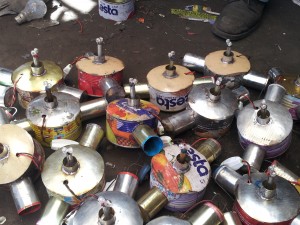I came across a short article by Ronald Coase (1991 Nobel laureate in economics) published at the Harvard Business Review a few months before he died, aged 103, in 2013. The article is a delicious call for economists to re-engage with the (real life) economy. I want to focus on just one sentence in the last paragraph of the article: “Market economies springing up in China, India, Africa and elsewhere herald a new era of entrepreneurship.” What makes it a new era? I don’t know what Coase had in mind specifically, but as I thought about it the idea of indigenous entrepreneurship came to mind.
I became acquainted with indigenous entrepreneurship through the work of Henrietta Onwuegbuzie, professor of entrepreneurship at Lagos Business School. Indigenous entrepreneurship refers to entrepreneurial activities that are based on indigenous knowledge – local knowledge that is unique to a given culture or society. Indigenous knowledge is at the basis of the so-called grassroots innovations: need-driven innovations generated to address problems faced by indigenous communities, with the potential to provide solutions to contemporary problems, and which tend to use greener techniques.

Two examples Henrietta provided:
- the owner of a watch store in a local Nigerian market recharges batteries using a small milk tin with a very short candle stuck upright inside the tin. The tin contains some water, and the candle is lit to heat it. Once the battery is placed in the tin with boiling water, the movement of electrons recharges it;
- a Nigerian medical doctor and entrepreneur, Dr. Oviemo Ovadje invented the Emergency Auto-Transfusion Set (EAT-Set): this is an inexpensive device for filtering and transfusing lost blood back into a patient, and it can be used even in the absence of electricity. The device (which you can see in this 43” video) has saved the lives of patients who could not otherwise have received a blood transfusion.
In a context of scarce resources, the old wisdom indigenous knowledge contains becomes imperative to finding solutions that make use of those limited resources. If we paid more attention to these clever solutions, maybe we would create more sustainable business models that create products which could cover the needs of a broad population – both in the developed and in the less developed world. Don’t you think indigenous knowledge could be a good basis for all kinds of entrepreneurship?


Woww , this is great!!!
Much better than the “programmed obsolescence” we are experiencing in many products in mature Economies. This makes our World unsustainable.
Thank you for sharing such an interesting post,
Mabel
This is a great point that you are making, Mabel! Thanks for the comment!
i though indigenous entrepreneurship was/is entrepreneurship by the indigenous people of the land. maybe u meant cultural entrepreneurship or maybe its all just semantics
Theresa, I think it’s a definitional matter. I followed Prof. Henrietta Onwuegbuzie review of definitions, and that’s the one she offers as a conclusion of the literature review. At the end of the day, when terms are new and there’s a certain ambiguity, what’s important is to know what’s behind the labels so that we know what we’re talking about. Thanks for pushing for the clarification!